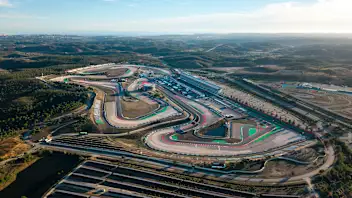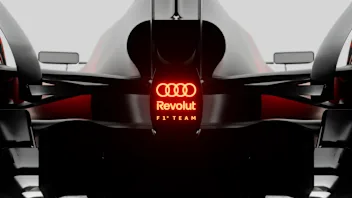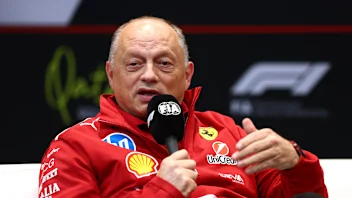Pre-Sakhir analysis - driver weight a hot topic
Though this year’s Bahrain round will be a night race for the first time, the debate over driver weights continued in the paddock at Sakhir on Thursday after suggestions in Malaysia that some of the heavier racers are dehydrating themselves right up until the end of qualifying in order to minimise their weight.
At 59 kg Williams’ Felipe Massa is believed to be the lightest driver currently, and at 75 kg Force India’s Nico Hulkenberg and Sauber’s Adrian Sutil, who are both tall, the heaviest. The drivers’ racing kit - flameproof underwear, socks, gloves, balaclava, boots, helmet and HANS device - adds around 4-5 kg. Last year Giedo van der Garde found his situation at Caterham so tight that the team reverted to the 2012 stepped nose because it was half a kilo lighter than the smoother 2013 version.
Weight has a huge impact on lap time. On a 5.412 km track such as Sakhir, every extra 10 kg can add three or four-tenths of a second, which is highly significant when you consider that in Malaysia the top 11 drivers in Friday practice were covered by a second… And though the minimum weight of 2014 cars rose from 642 to 691 kg, there is no allowance for disparity in driver weight in the overall equation, thus conferring a significant packaging and weight distribution benefit on teams who have lighter drivers.
McLaren’s Jenson Button said before the season that he needed to lose a kilo from his 71, and seriously considered going the dehydration route. But after spending five days prior to Malaysia doing humidity training at a camp in Phukhet run by four-time triathalon champion Chris McCormack, he revealed with evident relief that he no longer had the problem that he been anticipating.
“I was training with four pro athletes and it has been hard but really good,” he said. “Four hours a day, cycling for three hours, swim for an hour and sometimes a run. Really good, a good atmosphere, proper diet, and the menu gives you all the nutritional information - carbs, fat, protein. It’s a proper training camp and I don’t have a problem with weight at all. I thought I would be tight on it in Melbourne but I was fine so I can really eat now. I can actually eat carbohydrates and I feel better for it.
“But some guys are struggling. Sutil is, and I’m sure that the heavier drivers are dehydrating themselves because that’s what I was going to do - go in the sauna, have a steam, and not drink or eat until after qualifying. You would have breakfast but no carbohydrates and only stuff that goes right through you quickly. I was going to do it and did it all year until now, but it’s a shame for the guys who have to do it.”
Mercedes’ Lewis Hamilton, who has also struggled and is believed to be around 72 kg in his full kit, says of the practise of not keeping up all-important fluid intake until Saturday evening, “At the moment I’m pretty sure it’s hardcore what some people are doing. You can go into qualifying a little bit dehydrated. I heard someone was doing that, exhausting themselves. And then the next day they can drink some more because the race is different. For sure we’re like jockeys.
“In some ways it’s cool, another challenge through the winter. But you don’t want to become anorexic. It’s okay, as long as you don’t get to an unsafe area. If someone said I had to get down to Massa’s weight for example, then it would be silly. But at the moment we’re okay, the car is a decent weight, and we’re able to stay reasonably well within the weight limit. But for the really heavy drivers, I can’t imagine how it is for them. There’s a minimum they can physically get to without cutting an arm off.”
Sutil has revealed that he will do without a drinks bottle again this weekend, having omitted it in Australia from his Sauber, whose chassis is already reckoned to be up to 20 kg overweight.
"For Bahrain, it's one-and-a-half hours and you have to drive with no drink,” he said. “Normally you have one litre, or even one-and-a-half litres in Malaysia to drink, but in my situation you are talking about 300-400 kg. And that's already a lot. You also have to count the empty bottle which is half a kilo."
Like Button and Hamilton, Sutil is concerned about possible safety repercussions if a driver is dehydrated, since it is known that athletes in such condition perform less well.
"We are driving at 300 km/h on the straights and we have to be in good shape physically and mentally," he said. "It's not so easy anymore. You can't guarantee that every driver is on 100 percent from a physical point of view."
David Tremayne
Next Up
Related Articles
 Formula 1 to return to Portugal in 2027 and 2028
Formula 1 to return to Portugal in 2027 and 2028 Audi announce team name and global launch date for 2026 challenger
Audi announce team name and global launch date for 2026 challenger 10 ways to get your Formula 1 fix during the winter break
10 ways to get your Formula 1 fix during the winter break Abu Dhabi 'not a bad weekend' for Ferrari – Vasseur
Abu Dhabi 'not a bad weekend' for Ferrari – Vasseur Norris hopes title win doesn’t change him as a driver
Norris hopes title win doesn’t change him as a driver An exclusive look into Pierre Gasly's off-track life
An exclusive look into Pierre Gasly's off-track life